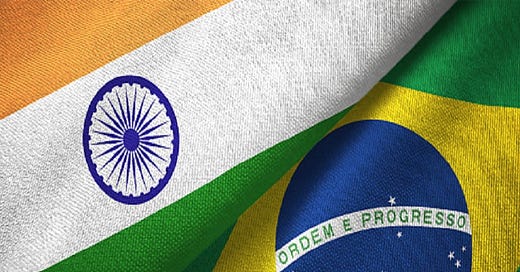Russia’s certainly right with respect to Brazil and India deserving permanent UNSC seats but it’s unrealistic to expect the Golden Billion’s three permanent members to agree to this, not to mention without also possibly bestowing the same privilege to their German and Japanese allies.
Russian Ambassador to China Andrey Denisov reaffirmed his country’s support for the permanent seats that Brazil and India have requested at the UNSC but confirmed that Moscow remains opposed to Germany and Japan’s. The first two would “increase the proportionate share of African, Asian and Latin American nations for the UN Security Council to be able to reflect the aspirations of people around the world and be a more democratic body” while the second pair would “make the imbalance [in favor of the US-led West at the UNSC] even more striking.”
This is a pragmatic stance that aligns with the global systemic transition to multipolarity. “The Great Bifurcation” caused by the New Cold War has resulted in the systemic divide between the US-led West’s Golden Billion and the BRICS-led Global South; the ideological/worldview one between unipolar liberal-globalists (ULGs) and multipolar conservative-sovereigntists (MCS); and the tactical division between the establishment and populists (mostly relevant in the organic sense with respect to the Golden Billion but potentially weaponizable by them against the Global South).
Brazil and India are Great Powers whose leading participation in BRICS – especially India’s role as part of its Russia-India-China (RIC) core – makes them engines of the economic-financial dimension of the emerging Multipolar World Order. They also practice a policy of principled neutrality towards the Ukrainian Conflict, which makes them leaders among their fellow Global South peers by virtue of their sheer size and growing influence. Their continued lack of a permanent seat at the UNSC is unfair because it deprives their regions – Latin America and South Asia – of proper representation.
The first-mentioned was arrogantly regarded as the US’ “backyard” for centuries but has proven its strategic autonomy since the start of the century while the second is among most populous regions in the world. South Asia also sits in the center of the Eastern Hemisphere where the world’s multipolar processes are increasingly converging, which makes its global strategic significance even greater than might appear at first glance. That said, UNSC reform isn’t possible without the agreement of all permanent members, which means that the US, UK, and France could easily obstruct this.
Those three representatives of the Golden Billion have a deep-seated interest in perpetuating the imbalance between their bloc and the Global South. To this end, it’s unrealistic to expect them to approve Brazil and India as permanent members, at least not without also granting such seats to Germany and Japan at the same time. Absent this potential compromise, which the Golden Billion might not even support in any case, those two BRICS members probably won’t ever receive the official political status in International Relations that they deserve.
In such a scenario, the UN as a whole would suffer since emerging powers like those two and others would have less faith in this global platform, not least because the UNSC would have proven to have been paralyzed by the systemic bifurcation of the New Cold War into practically making itself irrelevant by refusing to admit those two multipolar leaders as permanent members. That could in turn accelerate regionalization processes whereby Brazil and India assert themselves first and foremost through the regional integration platforms that they lead, which are MERCOSUR and SAARC respectively.
From there, these groups can then independently interact with their fellow Global South peers through what Russian scholar Yaroslav Lissovolik envisions as BEAMS. His op-ed for CGTN late last month described this concept as “the aggregation of the regional integration blocs of all of the five BRICS members – represented by the ‘BEAMS’ platforms consisting of the Bay of Bengal Initiative for Multi-Sectoral Technical and Economic Cooperation, Eurasian Economic Union (EAEU), the ASEAN-China Free Trade Area, Mercosur and the South African Customs Union.”
Truth be told, this alternative geo-economically driven model of globalization might ultimately facilitate the emerging Multipolar World Order a lot more in a practical sense than Brazil and India’s largely symbolic granting of permanent UNSC seats, though that outcome would nevertheless exacerbate the systemic bifurcation of the New Cold War and likely make it impossible to return to its previously globalized nature. That, however, isn’t necessarily a bad thing, though it should still be kept in mind by strategic forecasters across the coming decades.
Considering the insight shared thus far in this analysis, Russia’s certainly right with respect to Brazil and India deserving permanent UNSC seats but it’s unrealistic to expect the Golden Billion’s three permanent members to agree to this, not to mention without also possibly bestowing the same privilege to their German and Japanese allies. Be that as it may, alternative geo-economically driven globalization could function as a viable workaround for ensuring that those two Great Powers can flex global influence proportionate with their role in the emerging Multipolar World Order.





Mr.Korybko, thanks for the write-up. No seat please for RSS controlled regime which massacres & kills my people. They need apartheid South African treatment.